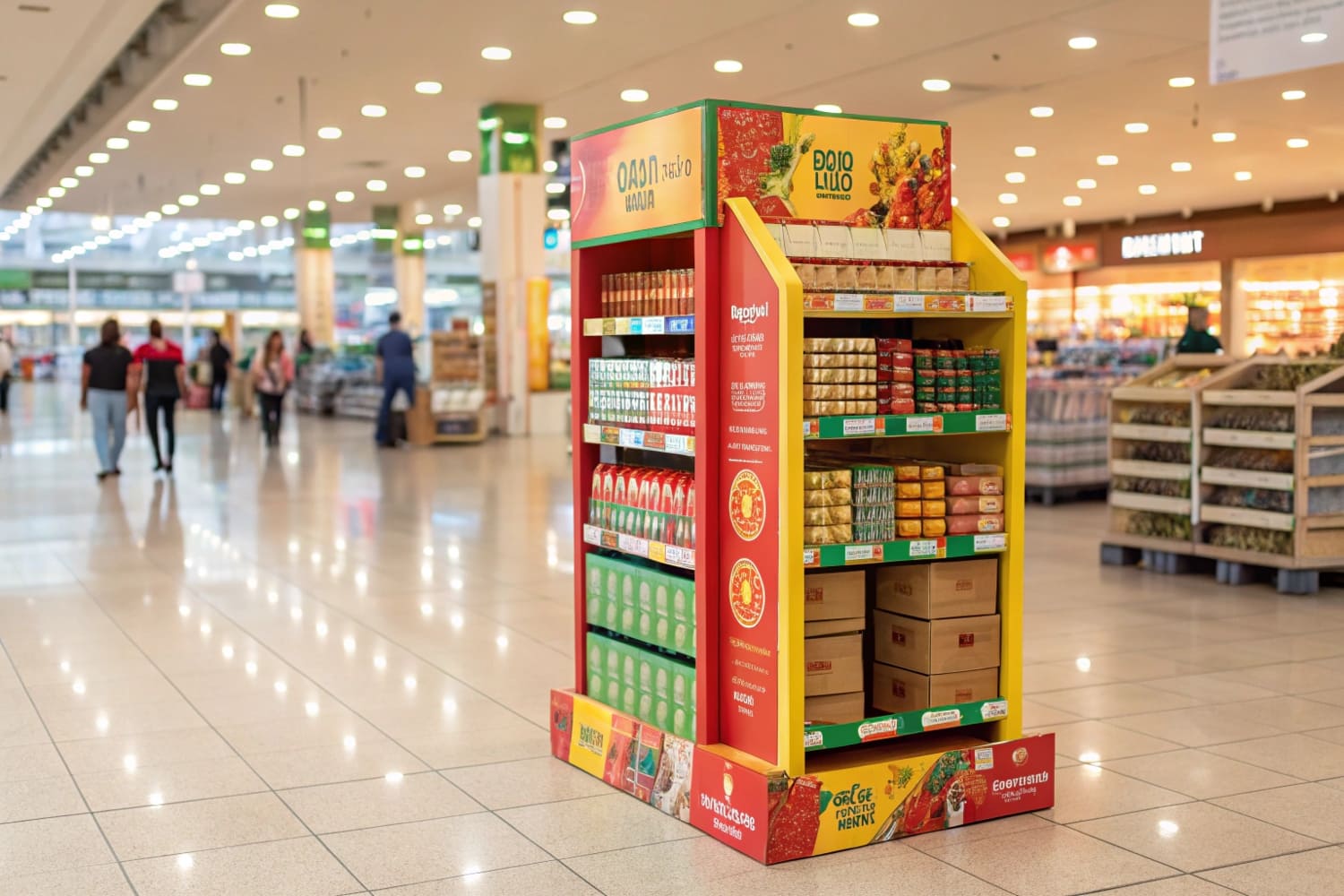I meet many buyers who love fresh ideas but fear wasted space and cost; this worry keeps them stuck with dull shelving.
Temporary POP displays turn empty floor space into profit fast, then leave without waste, giving brands flexible impact with low risk.
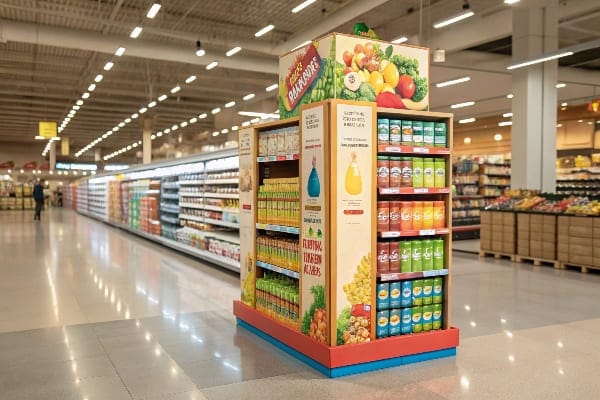
A quick example kept me hooked: I once dropped a cardboard tower into a grocery aisle and watched sales climb in one weekend. If a simple test drives numbers, why stop reading?
What are the advantages and disadvantages of pop displays?
Retail managers often fight two problems: tight budgets and shrinking attention spans. I felt both when my first rollout stalled in front of bored shoppers.
Pop displays grab attention, raise impulse sales, and cost little, but they can crowd aisles and add setup labor if designs ignore space limits.
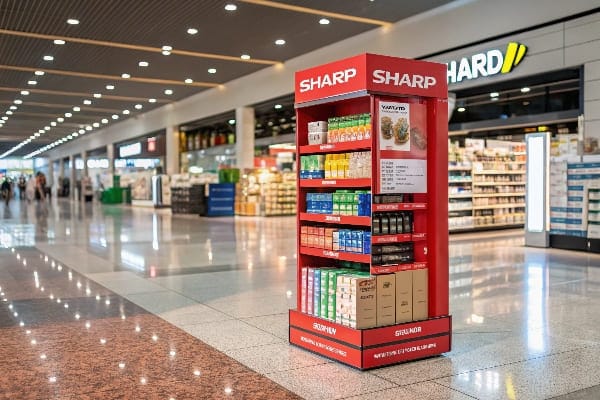
Advantage–Disadvantage Map
Below I break the topic into clear points so you weigh benefits against trade-offs before printing a single sheet of board.
| Aspect | Simple Note |
|---|---|
| Visibility | Stands in shopper path. |
| Cost | Cardboard stays cheap; freight light. |
| Customization | Print any graphic fast. |
| Footprint Risk | Block walkway if oversized. |
| Durability | Short life suits quick promos. |
| Labor | Staff must assemble unit. |
Story, numbers, and advice
I once shipped a U-shaped endcap to a U.S. hunting chain. It doubled crossbow accessory sales for two weeks. Then humidity buckled the shelves, showing why I use waterproof lamination1 today. Track your humidity, match material grade to climate, and always include clear assembly guides2. When balance is right, advantages crush the flaws. Plan size by store planogram3, reinforce load zones, and confirm weight with a simple drop test. This way each display lives long enough to win the sale yet exits before shoppers see wear.
Trade-show aisles are noisy, and I need one tool that stands tall without tools or screws. My first choice is the classic roll-up banner.
A pop up banner sets up in seconds, explains a product in one glance, travels light, and fits almost any budget.

Why banners still rule
| Benefit | Quick Reason |
|---|---|
| Speed | One person pulls up graphic. |
| Portability | Fits carry bag; checks as luggage. |
| Message Focus | Limited space forces clear copy. |
| Reuse | Swap cartridge, keep stand. |
Practical banner wisdom
At the SHOT Show I carried three banners under one arm while bigger booths wrestled crates. I placed a stalking-deer graphic behind our crossbow demo. Foot traffic stopped, photos snapped, and leads piled high. The roller base hid scratches from past shows; only the printed skin was new. I advise keeping text under twenty words, setting key spec numbers at eye level, and choosing matte finish to reduce glare. Combine the banner with a small countertop display so curious eyes drop to touch the actual product.
Why do merchandisers use pop displays?
When shelf tags fail to move stock, merchandisers hunt fresh touchpoints. I sat with one in Texas who said, “Give me a story, not a shelf.”
Merchandisers deploy POP displays to tell a focused story, direct shopper flow, and meet brand partners’ sales targets without rebuilding whole aisles.
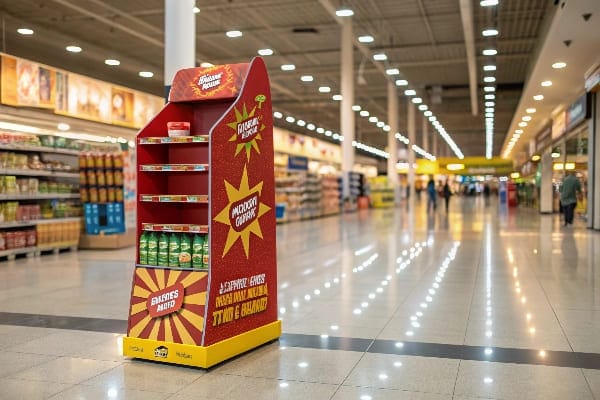
Merchandiser Goals vs. Display Tactics
| Goal | Display Tactic |
|---|---|
| Storytelling | Seasonal graphics, QR codes. |
| Flow Control | Endcaps, pallet skirts. |
| Cross-Selling | Clip strips linking items. |
| Data Tracking | Built-in NFC tags. |
From sketch to scan data
A merchandiser for a Midwest chain asked me to pair crossbow wax with string replacements. We built a sidekick hooked onto gun racks. Sell-through rose 38 % in four weeks. He captured SKU data and showed head office the bump. The display cost under \$40 and folded flat after the promotion. This shows why merchandisers love removable units4: they slot into existing fixtures, boost basket size, and leave zero trace later. The trick is aligning graphic themes with store campaigns and scheduling swaps on quiet weekday mornings to avoid shopper disruption.
What are the benefits of a pop up shop?
I remember renting a ten-day booth in a mall. Rent felt high, yet the exposure paid back in leads and raw cash.
A pop up shop tests markets quickly, drives urgency, and builds social buzz without the long leases of permanent stores.

Pop Up Shop Impact Grid
| Benefit | Simple Proof |
|---|---|
| Market Test5 | Track foot traffic before full store. |
| Scarcity6 | Limited dates spark FOMO. |
| Press Angle | Local media loves new pop ups. |
| Flex Cost7 | Pay days, not years. |
Lessons from the mall floor
My cardboard shelves held hunting calls and arrows. Because the shop stayed up only two weekends, shoppers felt the “now or never” rush. I collected emails for later online sales, saving future ad spend. When setting your own pop up, choose high-traffic corridors, negotiate utilities, and design displays that fold after closing night. Include a live demo zone; in my case, kids launched foam-tip arrows down a safe lane, pulling parents inside. Logistics remain simple: flat-pack displays arrive by courier, staff assemble with no tools, and the same units ship out to the next city.
What is the point of purchase pop display?
Retailers throw this term around, yet definitions shift. I keep mine simple.
A point-of-purchase POP display is any branded unit placed where buying decisions happen, guiding the shopper to take the product now.
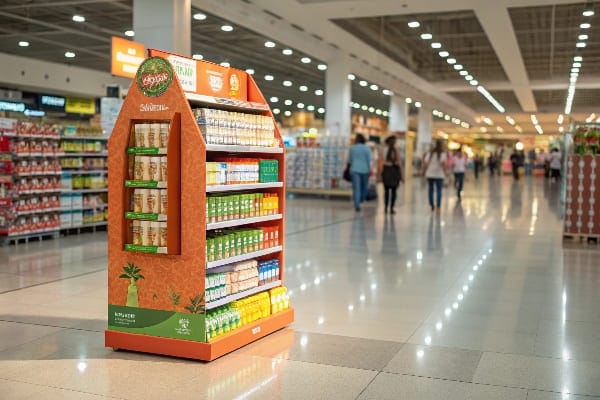
POP Display Types and Roles
| Type | Purchase Moment |
|---|---|
| Counter Unit | Checkout impulse. |
| Floor Stand | Aisle interruption. |
| Endcap | End-of-aisle attention. |
| Dump Bin | Bulk bargain grab. |
Mapping the purchase trigger
During a crossbow launch, I placed a compact counter display at firearm counters. It held wax kits priced under \$10. While customers filled background forms for expensive bows, they stared at the kit and added it to the cart. That is POP power8: intercept idle moments. To nail this, study shopper dwell time9, keep graphics crisp, and position price tags visibly. Remember certification pain points10: one U.K. retailer demanded FSC labels on wood-pulp board, so I stamped compliance logos in sight. When trust meets timing, the purchase clicks.
Conclusion
Temporary POP displays turn short-term floor space into measurable sales, proving that smart cardboard and clear graphics can punch above their weight before folding away.
Explore this link to understand how waterproof lamination can enhance the durability of your displays, ensuring they withstand humidity and last longer. ↩
Discover the significance of clear assembly guides in ensuring proper setup and customer satisfaction with your displays. ↩
Learn about store planograms to optimize your product placement and maximize visibility, leading to increased sales. ↩
Find out why removable units are favored by merchandisers and how they can enhance your display tactics without permanent changes. ↩
Exploring this resource will provide insights on how market tests can validate your business idea effectively. ↩
Understanding the psychology of scarcity can help you design your pop up for maximum impact and sales. ↩
This link will explain how flexible costs can make pop up shops more financially viable and less risky. ↩
Understanding POP power can enhance your marketing strategies by effectively capturing customer attention at critical moments. ↩
Exploring shopper dwell time can provide insights into optimizing store layouts and displays for increased sales. ↩
Learning about certification pain points can help retailers navigate compliance issues and build customer trust effectively. ↩

